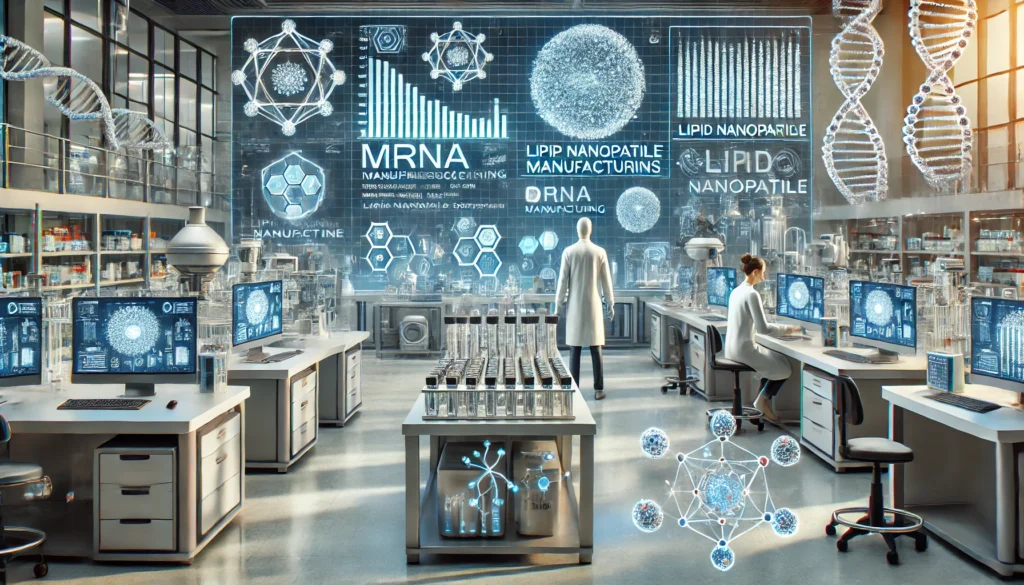Table of Contents
- A Short History of mRNA Technology
- Current Applications of mRNA Manufacturing
- Technological Advancements in mRNA Manufacturing
- Challenges Faced in mRNA Manufacturing
- Future Trends in mRNA Manufacturing
- Safety Implications and Regulations
- Global Impact of mRNA Manufacturing
- Final Thoughts
A Short History of mRNA Technology
mRNA technology has a captivating history that started gaining traction in the early 1960s. Initially, scientists viewed it more as an enigma, but it rapidly evolved with crucial developments over the decades. The discovery of mRNA marked a pivotal moment in science, unveiling the molecular mechanisms underlying genetic expression. The understanding that mRNA is a messenger between DNA and proteins opened a new frontier in genetic research. The story of mRNA is one of persistence and scientific curiosity, culminating in groundbreaking medical applications.
By the 21st century, this research paved the way for revolutionary advancements in healthcare, solidifying mRNA’s place in modern medicine. For a deeper dive into the evolution, check out this comprehensive history of genetics. Understanding the long journey of mRNA helps us appreciate its potential and the scientific rigor that has brought it to where it is today.
Current Applications of mRNA Manufacturing
The wide-ranging applications of mRNA manufacturing have particularly shone in the healthcare world. From the hastily developed mRNA vaccines for COVID-19 to emerging cancer therapies, the potential is vast. The successful deployment of mRNA vaccines during the pandemic was a testament to this technology’s flexibility and rapid development capabilities. Beyond vaccines, mRNA is being explored for its potential in treating genetic disorders, creating personalized medications, and even regenerative medicine by coding cells to produce necessary proteins. Today, GMP manufacturing is vital in delivering high-quality mRNA under stringent regulatory guidelines.
These applications showcase the adaptability of mRNA technology to combat various health challenges quickly and effectively. This detailed research article provides more information about these applications. The ability of mRNA to be tailored for specific medical needs makes it a versatile tool in modern medicine, capable of addressing a wide array of conditions with high precision and efficacy.
Technological Advancements in mRNA Manufacturing
Technological innovation has driven significant improvements in mRNA manufacturing. Critical methods like lipid nanoparticle delivery systems and advanced mRNA purification techniques have enhanced efficiency and scalability. Lipid nanoparticles protect the mRNA and facilitate its delivery into cells, where it can exert its therapeutic effects. Advanced purification methods ensure that the mRNA produced is of the highest purity and free from contaminants, which is crucial for safety and effectiveness. These advancements allow for more stable and targeted mRNA delivery, opening the door to new therapeutic options.
These innovations are not only making mRNA treatments more effective but also more accessible. The ability to scale production while ensuring quality is essential for meeting the high demand for mRNA-based therapies. As the technology advances, we can expect even more sophisticated delivery systems and manufacturing processes that will broaden the scope and impact of mRNA technology.
Challenges Faced in mRNA Manufacturing
Despite its promise, mRNA manufacturing faces multiple challenges. Issues of stability, storage, and potential side effects present considerable hurdles. The mRNA molecules are inherently unstable and require specific conditions for storage and transportation, often involving extremely low temperatures, which makes distribution a logistical challenge. Manufacturers also encounter difficulties scaling up production while maintaining the high-quality standards of GMP manufacturing sets. Additionally, understanding and mitigating potential side effects remains a critical area of ongoing research.
Addressing these challenges requires ongoing research and innovation to mitigate adverse impacts effectively. The development of more stable formulations, better storage solutions, and a thorough understanding of side effects will be crucial for the future success of mRNA therapies. Overcoming these hurdles will improve the efficacy and safety of mRNA treatments and make them more accessible to a global population.
Future Trends in mRNA Manufacturing
The future looks promising for mRNA technology. The trend leans toward personalized medicine, where mRNA sequences can be tailored to individual patient needs. This personalized approach can lead to more effective treatments with fewer side effects, as therapies are custom-designed for each patient’s genetic makeup. Moreover, enhanced mRNA delivery methods are on the horizon, alongside applications extending beyond infectious diseases to include areas like regenerative medicine and genetic disorders.
For instance, researchers are exploring mRNA’s potential in regenerating damaged tissues or organs by instructing cells to produce specific proteins necessary for repair. This could lead to breakthroughs in treatments for heart disease, neurological conditions, and more. These upcoming innovations are set to revolutionize the field and expand the horizons of medical treatment. The ability to quickly adapt and deploy mRNA therapies will also be crucial in responding to future pandemics and other public health emergencies.
Safety Implications and Regulations
The push for mRNA technology requires rigorous safety and compliance protocols. Every mRNA product undergoes extensive testing phases to meet stringent regulatory standards. These protocols ensure that therapies are both practical and safe for public consumption, boosting confidence and uptake within the population. Regulatory bodies such as the FDA and EMA have established detailed guidelines to ensure the safety of mRNA-based treatments, from manufacturing to clinical trials and beyond.
Understanding these safety protocols and regulatory frameworks is crucial for mRNA-based therapies’ broader acceptance and success. Public trust is paramount and transparent; thorough testing and reporting practices are significant in maintaining this trust. Ensuring the highest safety and efficacy standards will pave the way for broader adoption and innovative applications of mRNA technology in various therapeutic areas.
Global Impact of mRNA Manufacturing
The global implications of mRNA manufacturing are far-reaching. Technology plays a vital role in pandemic preparedness and emergency response, as demonstrated by the rapid development of COVID-19 vaccines. Beyond emergency uses, mRNA’s economic impact is significant, creating jobs and fostering innovation across the pharmaceutical and biotechnology sectors. Furthermore, mRNA’s economic impact and the fostering of international collaborations underscore its importance in global health strategies.
International collaborations have also been crucial in rapidly advancing and deploying mRNA technologies. These partnerships accelerate research, share resources, and streamline regulatory approvals, making lifesaving treatments available more quickly worldwide. The ability to respond rapidly to health crises with effective mRNA therapies will be instrumental in addressing future public health challenges and improving global health outcomes.
Final Thoughts
mRNA manufacturing is undeniably at the frontier of medical innovation, promising dramatic shifts in treatment paradigms and disease prevention. Although challenges persist, the relentless pace of technological progress and scientific dedication fuels optimism for the future. The continuous advancements in mRNA technology suggest that its role in healthcare will grow increasingly significant, providing new avenues for treatment and prevention.
As developments unfold, mRNA technology is set to become a cornerstone of 21st-century healthcare, offering hope and tangible benefits for various medical conditions. The potential of mRNA to revolutionize medicine is immense, and with continued research and innovation, the future of healthcare looks brighter than ever.







